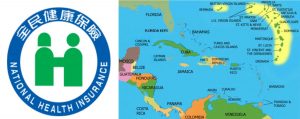
The entire Caribbean region is in the process of developing some form of universal health insurance for its citizens within the next ten years. Caribbean nations include: Antigua, Aruba, Bahamas, Barbados, Bermuda, Bonaire, Cayman, Grenada , Jamaica, St. Lucia and Trinidad & Tobago just to name a few.
However, Taiwan has frequently been the model that many countries have looked up to as a successful role model for developing universal coverage for its citizens. Taiwan launched the National Health Insurance (NHI) initiative in 1995 by integrating medical programs from existing insurance systems for laborers, farmers, and government employees, which covered only half the population. This has since been expanded to provide equal coverage to all citizens from birth, regardless of age, financial status or employment status. Furthermore, all foreigners who legally work or reside in Taiwan are also afforded the same coverage. Oddly enough for whatever reason Taiwan is currently not a member of the World Health Organisation despite having ranked very high in the world for giving its citizens access to high quality affordable healthcare.
Keys to Taiwan’s success included, the adoption of a single-payer model with contributions from individuals, employers and the government. A supplementary premium is also charged based on payers’ income levels. Second, to control medical expenses, a budget payment system was adopted to set caps on health care costs paid by the government. It is hoped that the consultants and other experts that Caribbean governments have retained to assist will take note of Taiwan’s experience and therefore not reinvent the wheel.